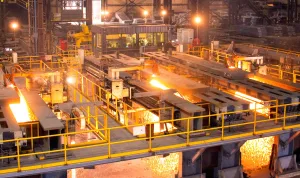Ensuring Excellence: How Hong Kong’s Steel Industry Handles Quality Control

The steel industry in Hong Kong is pivotal not only for local infrastructure but also as a key player in the global market. To maintain its reputation and competitiveness, the industry must implement robust quality control measures. This article explores how Hong Kong’s steel industry handles quality control, focusing on processes, standards, and challenges.
1. The Importance of Quality Control in Steel Production
Quality control is crucial in steel production to ensure that products meet specific standards for strength, durability, and safety. Given the diverse applications of steel in construction, manufacturing, and other sectors, maintaining high-quality standards is essential.
- Consumer Confidence: High-quality steel products foster consumer trust and loyalty, essential for long-term business success.
2. Quality Control Processes
Hong Kong’s steel manufacturers employ a variety of quality control processes to ensure product integrity. These processes include:
- Raw Material Inspection: Before production begins, raw materials are rigorously inspected for purity and specifications. This step is vital to avoid defects in the final product.
- In-Process Monitoring: During production, continuous monitoring of temperature, pressure, and other parameters ensures that the manufacturing process remains within established limits.
- Final Product Testing: After production, steel products undergo various tests, including tensile strength, impact resistance, and chemical composition analysis. This testing ensures that the products meet both local and international standards.
3. Compliance with Standards
To uphold quality control, Hong Kong’s steel industry complies with several national and international standards.
- ISO Certification: Many steel manufacturers in Hong Kong obtain ISO 9001 certification, which sets criteria for a quality management system. This certification signifies that the manufacturer consistently produces products that meet customer and regulatory requirements.
- Local Regulations: The industry also adheres to local standards established by the Hong Kong Standards and Testing Centre (STC) and other regulatory bodies, which help ensure the safety and reliability of steel products.
4. Challenges in Quality Control
Despite robust systems, the steel industry faces several challenges in quality control, including:
- Global Supply Chain Issues: Disruptions in the supply chain can affect the availability and quality of raw materials, posing risks to production consistency.
- Technological Advancements: As technology evolves, manufacturers must continuously upgrade their quality control measures to keep pace with new methods and materials.
5. Technological Innovations
To enhance quality control processes, Hong Kong’s steel industry is increasingly adopting advanced technologies.
- Automation and AI: Automation tools and artificial intelligence (AI) are being utilized for real-time monitoring and predictive maintenance, allowing for quicker identification of potential quality issues.
- Data Analytics: Data analytics plays a significant role in assessing production quality trends, enabling manufacturers to make data-driven decisions to improve processes.
6. Training and Workforce Development
A well-trained workforce is essential for effective quality control. Hong Kong’s steel companies invest in continuous training programs for employees, focusing on quality management practices and emerging technologies.
- Workshops and Certifications: Regular workshops and certification programs help ensure that employees stay updated on the latest quality control methodologies and regulatory requirements.
Conclusion
Hong Kong’s steel industry employs a comprehensive approach to quality control, combining rigorous inspection processes, adherence to standards, technological innovations, and workforce training. As the industry continues to evolve, maintaining high-quality standards will be vital for its competitiveness in the global market.
In summary, effective quality control in the steel industry not only safeguards product integrity but also enhances the overall reputation of Hong Kong as a hub for high-quality steel production. For further insights on quality control practices in steel manufacturing, you can explore additional resources and industry reports.



